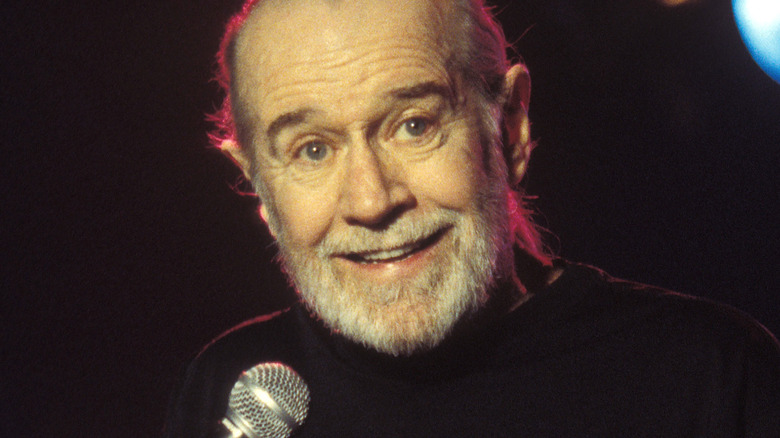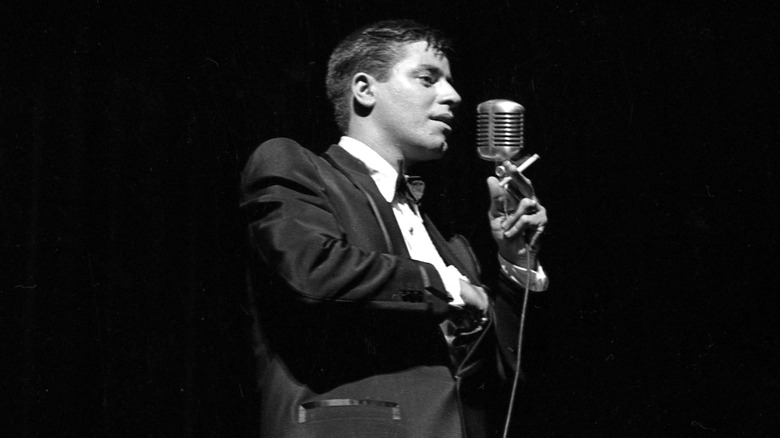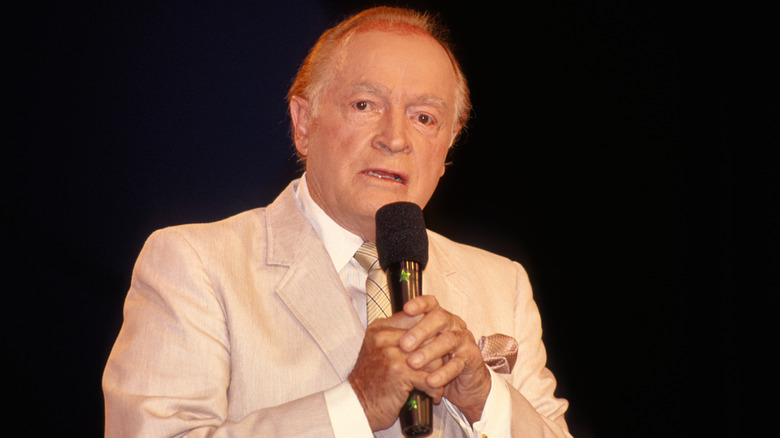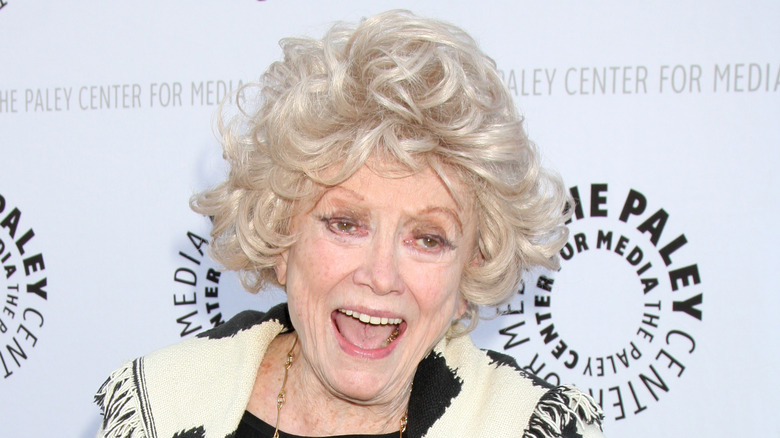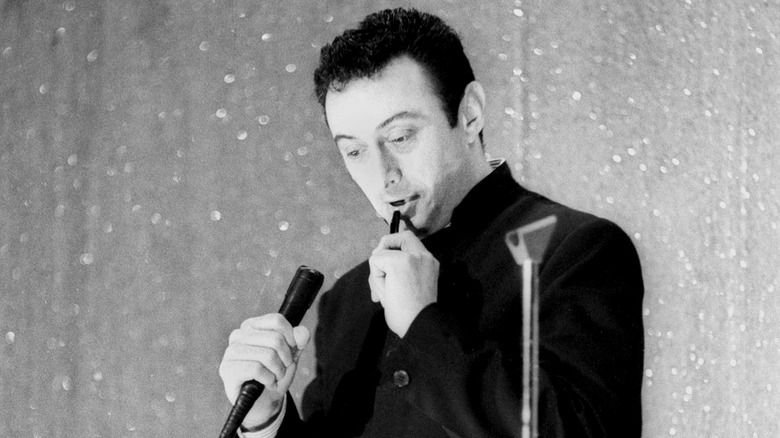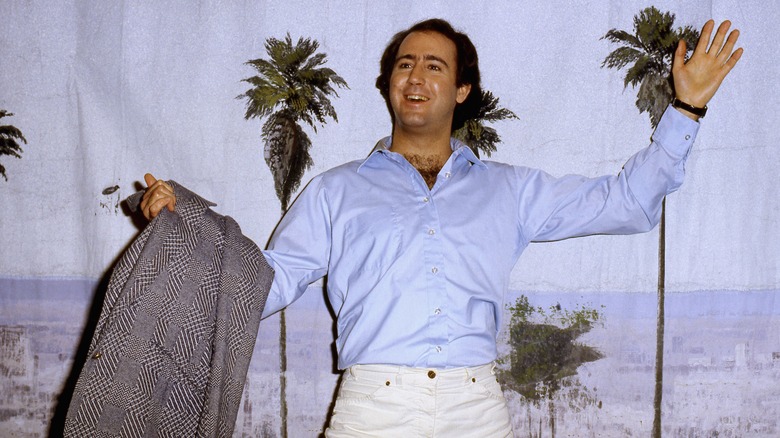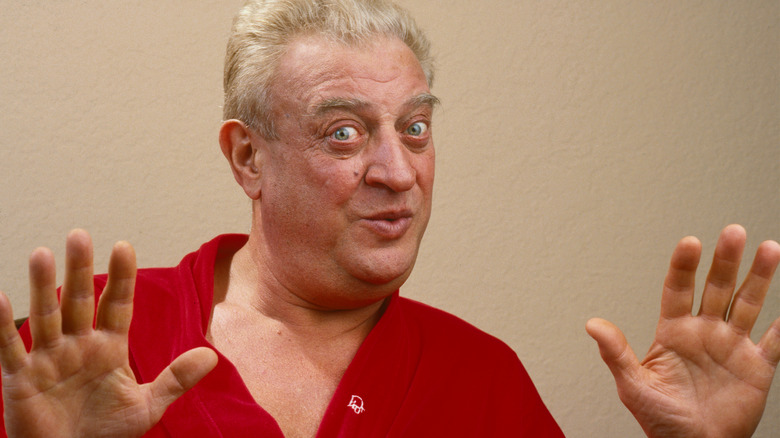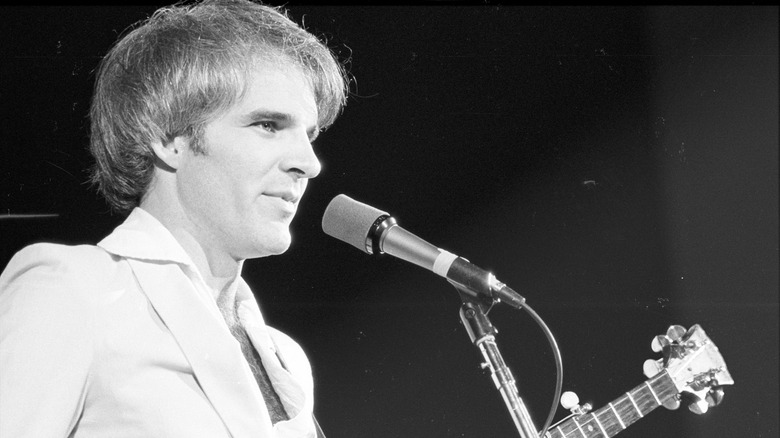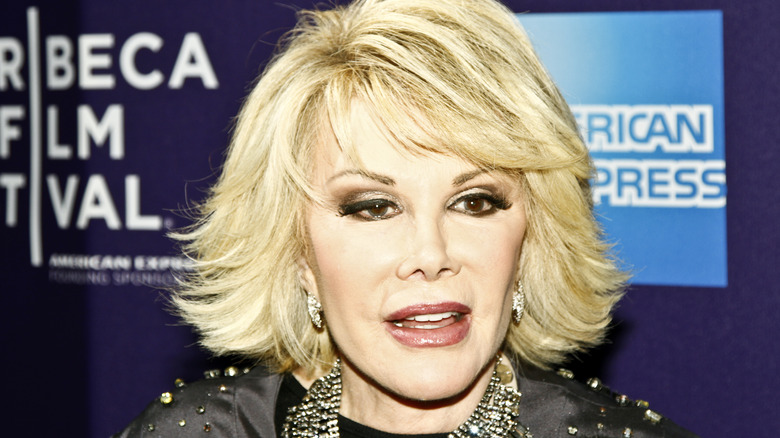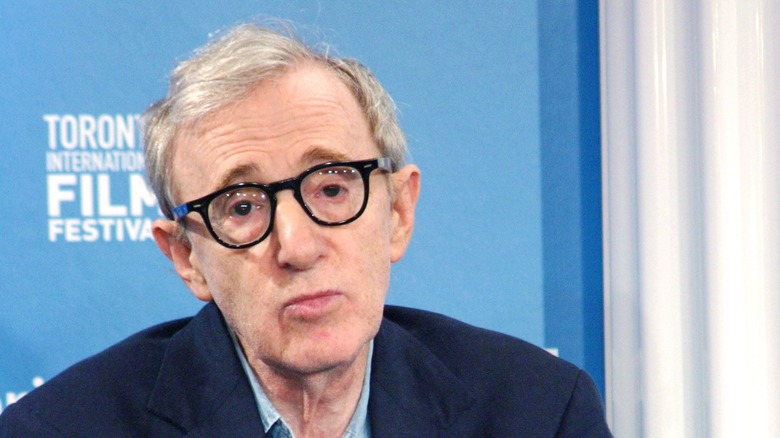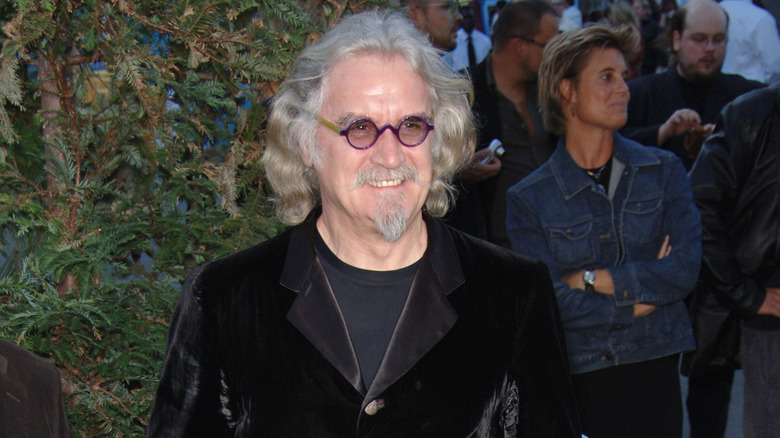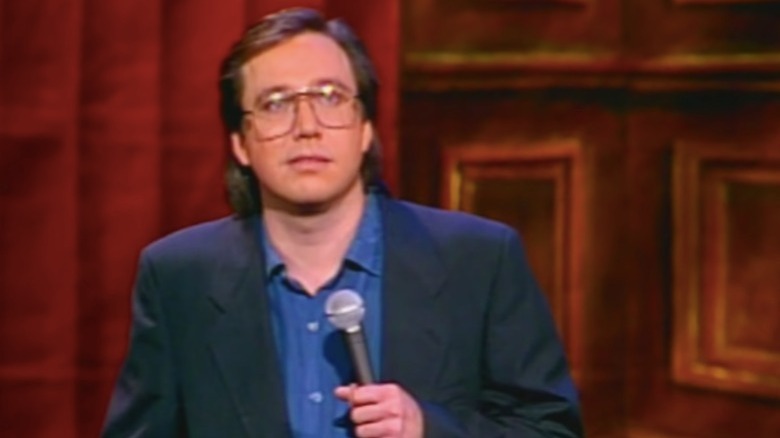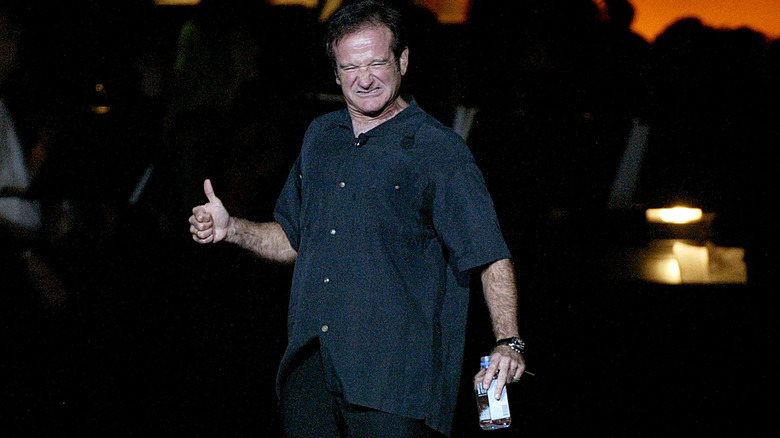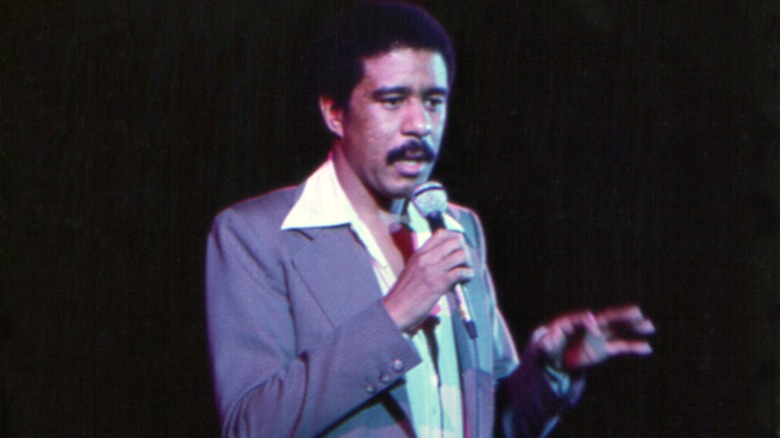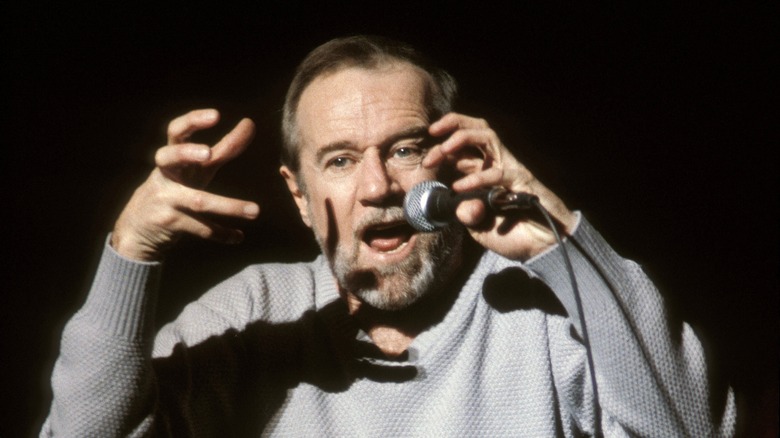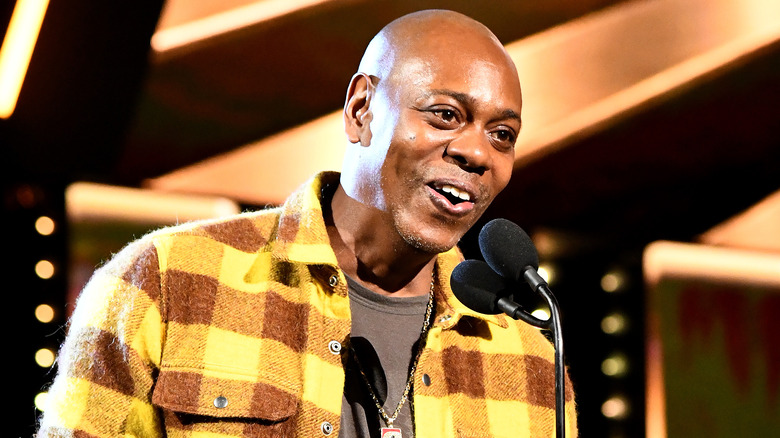The Best Stand-Up Comedians Of All Time
Over the course of the last decade, stand-up comedy – a performance usually consisting of nothing more than a single performer saying funny things into a microphone – has experienced a boom the likes of which it has never seen before. In 2015, The Wall Street Journal reported that the comedian Kevin Hart was due to perform for more than 50,000 people at the football stadium that usually houses the Philadelphia Eagles, and noted with astonishment that several other leading stand-ups were now attracting "rock-star audiences." The previous year, the stand-up and ventriloquist Jeff Dunham set a new Guinness World Record by selling almost 2 million tickets to fans for his "Spark of Insanity" tour. And since then, stand-up has remained a big draw, with Netflix reportedly paying millions for the exclusive rights to top comedians' stand-up specials.
Never has stand-up been more in demand, and never have there been so many comedians of all stripes attracting huge audiences looking for talented performers adept at holding a mirror up to the absurdities of modern life. But though the art form is now bigger than ever, today's leading lights owe a debt to generations of comics who came before them and blazed a trail to make stand-up what it is today. Here are some of stand-up comedy's all-time greats, and why they still matter.
Jerry Lewis
When the death of Jerry Lewis was announced in 2017, few could deny the incredible impact that the comic had, not just on comedy, but on the whole of American entertainment. Best known for his partnership with the Rat Pack's Dean Martin, which began in 1946 and lasted the best part of a decade, Lewis exuded physicality and a rubber-faced brand of clowning that had rarely been seen by American audiences. Moving from nightclubs to TV and eventually to Hollywood as both a star and a director, Lewis' innovations were underpinned by an entertainment pedigree; he emerged from a family with deep roots in traditional vaudeville, which explains his naturalness in front of audiences and on-camera (per Britannica).
But the true genius of Lewis was that he wasn't simply a two-dimensional stage persona. As The New York Times notes, Lewis dazzled audiences with an almost kaleidoscopic display of his hugely multifaceted personality, giving the impression that was not just one man on stage, but many, with hyperactive comedians in Lewis' wake such as Robin Williams and Lee Evans taking cues from the hugely influential entertainer.
Bob Hope
There are few more recognizable faces in American entertainment than Bob Hope, whose name remains a byword for the professional American comic. Emerging, like Jerry Lewis, from vaudeville, Hope progressed from dance routines to comic roles in musicals, to radio and movies, to become the "king of media" by the early 1940s, according to Biography. But Hope's name also lives on because of his innovative stand-up routines.
Per the Miami Herald, Hope differed from other stand-up comedians of his era because of his topicality. Whereas many comics toured sets of fixed material, from the 1930s onwards Hope reacted to news and current events and tailored his act to provide satirical commentary on the world around him, a facet of his act that would become a staple of the stand-up form ever after.
And Hope was also a pioneer of the idea of comedian-as-writer, leaving behind some 85,000 pages of finely crafted jokes at the time of his death in 2003, at the age of 100 (via Biography).
Phyllis Diller
While many mid-20th-century comics were trained in stagecraft since childhood, the trailblazing comic Phyllis Diller came to the art relatively late. She was already a housewife and mother of five children and successful as a journalist at the San Leandro News-Observer when she appeared on TV for the first time in 1958. But according to Biography, Diller wasn't booked as a featured performer, but as a contestant on the long-running game show "You Bet Your Life," hosted by the legendary comic Groucho Marx.
As Diller explained to Marx and to the audience, though she already had a life carved out for herself, she was certain that she was good enough to be a professional comedian, and had already had her first nightclub bookings. Marx invited Diller to perform some of her material, and though the quiz show setting created a somewhat stilted atmosphere, no one could deny Diller's natural comedic timing and her magnetic persona. The appearance led to many more bookings, during which Diller perfected her act focusing on the lives of ordinary American women and poking fun at married life and the oddities of suburbia.
Per Britannica, an appearance in the early 1960s on "The Jack Parr Show" saw Diller reach an even greater audience and become a household name, with TV and movie deals in the works, including appearances alongside her fellow comedian and good friend Bob Hope. Biography notes that Diller, who died in 2012 at the age of 95, had many talents, including as a touring pianist and as a bestselling author, but it will always be for her idiosyncratic, raucous stand-up that she will be best remembered.
Lenny Bruce
For many, today's alternative comedy would be nothing without comedians having the power to shock their audiences, as is the opinion of many comics who campaign for the right to free speech as a means to exercise freedom of expression. But whether comedians today are right or wrong about the dangers of censorship in the 21st-century, performers of previous generations undoubtedly had to bear such concerns in mind.
None more so than Lenny Bruce, a provocative and confessional performer who was in many ways the original rebel comic. The precursor to latter-day greats such as Richard Pryor and George Carlin (per The First Amendment Encyclopedia), Bruce was plagued throughout his career with charges of obscenity, which saw him blacklisted from performing in many prominent comedy clubs, damaging his career, while he was also regularly arrested for possession of narcotics, according to The New York Times.
Bruce rose to national prominence through appearances on "The Steve Allen Show," on which he spoke openly about drug use, and criticized some of the biggest celebrities of the day, such as Elizabeth Taylor. Live, Bruce's set was a full-on aural assault, with some sketches – including one in which he performed an extended barrage of racial slurs (Bruce was Jewish) – truly shocked audiences across the country. More than 100 supporters defended Bruce at his obscenity trial, and though the charges would stick during his lifetime he would be posthumously pardoned in 2003, per The New York Times. Bruce died tragically of a drug overdose in 1966, at the age of 40.
If you or anyone you know is struggling with addiction issues, help is available. Visit the Substance Abuse and Mental Health Services Administration website or contact SAMHSA's National Helpline at 1-800-662-HELP (4357).
Andy Kaufman
Andy Kaufman almost single-handedly merged the two arts of stand-up comedy and performance art, establishing a repertoire of experimental and boundary-breaking material that questioned the nature of performance and heralded the dawn of postmodernism in comedy, or "meta-comedy," as it is more commonly known today.
Per Britannica, Kaufman never told traditional jokes. Instead, his performances were characterized by seemingly banal routines – such as reading aloud from "The Great Gatsby" – which worked to elicit nervous laughter more than anything else. Kaufman also subsumed himself in strange characters, such as the unlikeable lounge singer Tony Clifton, whom he claimed was not a character at all, but a real, separate person in his own right.
Kaufman reportedly died of lung cancer in 1984, aged just 35. But according to many of his fans, his apparent death was just another of the comedian's great stunts. Some claim that Kaufman faked his own death as a final subversion of fame and celebrity culture. Even in 2013, Kaufman's own brother maintained that the comedian was still alive and thriving, and had since become a father – Kaufman's brother even introduced a woman claiming to be his daughter to the crowd at the annual Andy Kaufman awards, according to The Hollywood Reporter. However, no hard evidence of these claims has ever come to light.
Rodney Dangerfield
Modern comedians are generally, and perhaps rightly, growing increasingly suspicious of catchphrases, which proliferated in both stand-up performances, sitcoms, and variety shows for the best part of the previous century. But there is no denying that Rodney Dangerfield, who remained ever-loyal to his shtick, hit upon something timeless when he decided to build his at around the belief that he got "no respect" from the world around him.
An alteration of Dangerfield's earlier oft-repeated maxim that "nothing goes right" – the comedian rephrased the line under the influence of the 1969 novel "The Godfather," according to USA Today – Dangerfield's career-defining catchphrase was no cheap gimmick. In fact, as argued in The New York Times, Dangerfield's claims of getting "no respect" signaled a blackly pessimistic worldview, one that underpinned his best comedic writing. "Rodney believed that everyone, regardless of their age or circumstances, ends up getting hurt, betrayed, or taken advantage of," his wife, Joan, told USA Today.
But more than anything, Dangerfield was an exceptionally talented and diligent writer, who worked on his material like a master-craftsman. The comedian Robert Klein describes him as "one of the finest joke writers of all time" (via Rolling Stone).
Steve Martin
The success that Steve Martin enjoyed as a stand-up comedian in the 1970s was unlike anything that the industry had seen before. Wowing audiences with a one-man "wild and crazy guy" act in which he performed impressions, deployed props, and sang songs in a variety of styles, Martin sold out 10,000-seater stadiums, while his comedy albums went multi-platinum (via JSTOR). Singlehandedly, Martin expanded the bounds of comedic commercial success, while giving the generation of comics that came after him the tools to get laughs from such unthinkably large audiences.
Martin quit performing stand-up in 1981, just as his Hollywood career was about to hit his peak, though according to Entertainment Weekly Martin later claimed to have quit stage comedy as he was "essentially depressed." In the years that followed, Martin enjoyed enormous big-screen success in movies such as "Three Amigos" (1986), "Planes, Trains & Automobiles" (1987), and "Father of the Bride" (1991), all remembered today as classic comedies. He eventually returned to stand-up in 2016, and continues to perform, having recently found great success in a double act with longtime collaborator Martin Short.
Joan Rivers
An evergreen presence on the red carpet and at multiple awards shows per year prior to her death in 2014 at the age of 81, Joan Rivers built her six-decade career on exquisite one-liners that shocked audiences by saying the unsayable. "I succeeded by saying what everyone else is thinking," Rivers said of her own comedy, according to The Guardian. In doing so pioneered the comedic art of purposefully making audiences uncomfortable.
As noted by the comedian Annabella Weir (via The Guardian), Rivers was a "fearless" performer, never afraid to craft jokes that used the tragedies of her own life as well as the darker themes of aging and death as her material. Though a name synonymous with glamour from the very start of her career, Rivers gave the impression of never caring what people thought of her, according to Weir, leading the way for such figures as Sarah Silverman and Ali Wong by showing how women in comedy could subvert stereotypes around how women should be seen and what women could talk about on stage.
Woody Allen
Best known today for his work as a director – and, it must be said, for the ongoing controversies surrounding his personal life – Woody Allen first made his name on American screens as an idiosyncratic and instantly recognizable stand-up in the 1960s. Characterized by absurdity and distinctive turns of phrase – e.g., "I had a pain in the chestal area," via The New Yorker – Allen's anxious stage performer was unlike anything American audiences had seen before and made him a star overnight.
Influenced by the acclaimed stand-up Mort Sahl, Allen – who became a professional joke writer for NBC at the tender age of 17 – embraced the concept of "comedy in the form of therapy," according to Dead Frog, and distinguished his treatment of traditional comedic subjects – such as marriage – by the quality of his writing and his glittering intelligence. By the late 1960s, Allen was already done with stage comedy, but the persona he created still reverberates throughout his filmography and the work of later comedians such as Richard Lewis and Larry David.
Billy Connolly
A force of nature when he first arrived in front of UK audiences in the 1970s, Glasgow-born Billy Connolly – known affectionately to his fellow Scots as the "Big Yin," thanks to his 6-foot stature – virtually invented the anecdotal form of stand-up comedy as it exists today. Mindbogglingly, Connolly never writes down his material, or memorizes it; instead, Connolly made his name sharing funny stories he knew, never realizing in the early days that other comedians had pre-written their shows, according to The Sunday Post.
Nor did Connolly become famous for telling typical jokes, but rather by trying to make audiences laugh as he would a drinking partner. "When you're in a bar when people are coming out of work, you'll hear big belly laughs coming from them," Connolly notes, per the same source. "Then you'll go home and watch a comedian on TV and you'll say, he's good, but you'll not be laughing."
Connolly explains that, rather than that of a typically polished stand-up comedian, the performing style that made him famous – which has influenced the rhythms of countless comedians over the years, whether they were performing written material or truly improvising – is nothing more than the kinds of funny stories that people tell each other in ordinary settings the world over: "Those people in the pub are just doing it for the joy, and I often think in my career I've tried to be as funny as ordinary people are, just being funny about things that matter around them but not necessarily to anyone else."
Bill Hicks
Considered by many of his fans to be the patron saint of alternative comedy, Bill Hicks emerged from a deeply devout Southern Baptist family who traveled to various states before settling in Houston, Texas, where the young Hicks first developed a love of stand-up comedy, according to Britannica.
Hicks began performing comedy in his teens, against the wishes of his family, influenced by such figures as Woody Allen and Jerry Lewis, and after some initial disappointments, he connected with such boundary-pushing figures as the scream-comic Sam Kinison to form the Texas Outlaw Comics comedy group, pushing stand-up in more confessional, philosophical, and socio-critical directions. But more so than his contemporaries, the hard-working Hicks – who at one time was performing around 300 shows a year, per Britannica – emerged as a confrontational yet didactic figure, a preacher in his own right whose voice boomed with moral authority.
Famous comedians with a deep admiration for Hicks include figures as varied as Richard Pryor and Simon Pegg, according to Vulture, while his classic performances such as "Dangerous" and "Sane Man" remain touchstones for subversive comics looking to tell it like it is. Hicks died tragically of pancreatic cancer in 1994, aged 32.
Robin Williams
The hearts of millions of comedy fans were broken in 2014 when news broke that the legendary comic Robin Williams had died in tragic circumstances at the age of 63. Williams had become a much-loved Hollywood actor in the previous three decades, most notably in the comedy classic "Mrs. Doubtfire" (1993), in which he portrayed the title character, and in the drama "Good Will Hunting" (1997), for which he won a Best Supporting Actor Oscar, as well as a slew of family-friendly blockbusters.
But before his big-screen ubiquity (and his becoming a famous face on American TV as an alien in the late 1970s show "Mork & Mindy") Illinois-born Williams made his name as a stand-up, initially building his profile as a comic around San Francisco following a debut gig at the zoo at which he worked, according to SFGATE.
Williams' mix of mania and melancholy gave him a broad palette, and his natural abilities as a character actor, impressionist, and all-around performer made him a stand-up who could seemingly create anything out of nothing. His abilities would infuse his TV and movie performances to make him an international star, but as a stand-up, it is arguable that Williams had no equal.
If you or anyone you know is having suicidal thoughts, please call the National Suicide Prevention Lifeline at 1-800-273-TALK (8255).
Richard Pryor
Richard Pryor might have been a mediocre comic if he had followed the career path that first propelled him to the stage in the late 1960s. According to his official biography, the comedian made his first television appearances on such big-name showcases as "The Ed Sullivan Show," plying a brand of family-friendly comedy pioneered by Black comedians such as Bill Cosby, before taking a lucrative contract performing for audiences in Las Vegas. But frustrated by the identity being foisted upon him, Pryor abruptly walked off stage during one performance, bent on reimagining his act in a form truer to his lived experience.
Pryor had been raised in abject circumstances, having suffered sexual abuse as a child and lived through poverty, taking a string of low-paid jobs after being expelled from school at the age of 14. Having returned to comedy after what The Guardian claims was Pryor's onstage "epiphany," the comedian re-emerged as the ultimate chronicler of Black American life, whose fearlessness and taboo-breaking material redefined stand-up comedy forever. Unashamed in delving into the darkest recesses of his own damaged psyche, Pryor crafted bits from even the most painful elements of his life, including notorious stories about his private life which, at the height of his fame, had already made headline news.
Seinfeld has described Pryor as "the Picasso of our profession" (via The Guardian) while he was also honored for his contribution to the craft in his own lifetime, winning the inaugural Mark Twain Prize for American Humor in 1998, per The Chicago Tribune.
If you or anyone you know has been a victim of sexual assault, help is available. Visit the Rape, Abuse & Incest National Network website or contact RAINN's National Helpline at 1-800-656-HOPE (4673).
George Carlin
The late, great George Carlin died just months before receiving his own Mark Twain Prize in 2008, but by then the comedian's legacy was already assured. Known to viewers of all ages as the sage time-traveler Rufus in the "Bill & Ted" movie franchise, Carlin was most respected for his skills as a stand-up, and for his singular brand of morally outraged and hypocrisy-averse social commentary.
Dubbed "the dean of counterculture comedians" (via cleveland.com), Carlin's anti-authoritarian outlook made him the William S. Burroughs of stand-up, whose radical world view was nevertheless tempered and made digestible by his natural joke-writing ability and charismatic performances. Via NPR, one of Carlin's most famous bits, "seven words you can't say on TV," is a masterful lampooning of the duplicity of censorship and the external forces that enforce it. The bit is representative of Carlin's ability to deconstruct the absurdity of the unsaid rules that govern our lives.
Honored after his death by such heavy-hitting comedians as Joan Rivers, Garry Shandling, and Jon Stewart (via NPR), Carlin continues to exude a profound influence over generations of comics up to the present day.
Dave Chapelle
The era-defining sketch comedy "Chapelle's Show" made Dave Chapelle a household name in the U.S. and beyond in the early 2000s, and the show has enjoyed a remarkable afterlife in the internet age thanks to the rise of meme culture and the demand for quick, instantly-satisfying comedy clips. Back then, Dave Chapelle was also well-regarded as a stand-up, whose classic specials such as his 2000 HBO debut "Killin' Them Softly" saw the comedian offer incisive social critiques on contemporary issues and race in America offered through what Britannica describes as his likable "impish" stage persona. Then, at the height of his fame, Chapelle vanished, turning down a reported $50 million contract to continue making "Chapelle's Show," and retreating to Yellow Springs, Ohio. There, Chapelle living avoided the public eye – bar a smattering of appearances – for the best part of a decade, per GQ. He eventually returned to the stage full-time in 2013, and though he occasionally hinted at the reason behind his career hiatus, the exact circumstances remain a mystery.
Chapelle has been prolific since his return to stand-up, racking up six Netflix specials between 2017 and 2021. At the same time, what The New Yorker describes as his "incendiary" subject matter has seen him become a more controversial figure than ever before.
In 2019, Chapelle accepted the Mark Twain Prize for American Humor (via NPR), putting him on a par with his greatest influences, such as Richard Pryor and Eddie Murphy, and solidifying his reputation as one of stand-up comedy's all-time greats.
